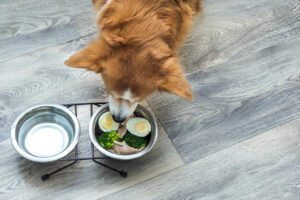A common food in many homes, eggs may provide dogs with a lot of protein and other minerals.
What about the shells, though? Can dogs eat egg shells too?
We’ll go over the advantages of giving eggshells to dogs as well as their safety in this post. We’ll also quickly confirm that eggs are generally safe for dogs. Can dogs eat egg shells?
Can Dogs Eat Egg shells securely?
Can dogs eat egg shells? Yes, Dogs can safely consume eggshells, but it’s crucial to use shells from reputable farms that produce eggs. Steer clear of most eggs from the grocery store because they’ve probably had a chemical treatment to make them shiny.

You should also select eggs from organic pasture-raised chickens that are free of hormones and antibiotics. Generally speaking, these eggs are healthier and devoid of dangerous substances.
Rinse the eggshells after making eggs and store them in the fridge until you’re ready to cook them. After washing off any visible dirt (such as chicken feces!), allow the shells to dry completely. To make sure they are scorched, you can bake them at 200°F for ten to fifteen minutes.
Rather than feeding the eggshells in chunks, grind them into a fine powder (a clean coffee grinder works well for this). By doing this, the eggshells will taste better. If you want to give your dog the benefits of eggshells, you can store the powder in an airtight jar and sprinkle it over his food.
Does Your Dog Get Salmonella From Eggshells?
You may have heard that dogs are susceptible to salmonella while eating uncooked eggs. Dogs’ digestive systems, however, are well-suited to manage bacteria like salmonella that can be present in raw eggs, despite common perception to the contrary. However, if you’re concerned about bacteria, you can boil them for ten minutes and then let them dry before grinding, or bake them in the oven as described above.
Advantages
What makes dog eggshells so unique? Although eggs are a great source of many healthful elements, eggshells, in particular, are noteworthy for two reasons:
Calcium carbonate, used to make eggshells, supports your dog’s strong teeth and bones. One big egg’s shell typically yields around 1 teaspoon or 5 grams of eggshell powder when it is processed into a powder. For every gram of eggshell powder, around 350 mg of calcium is present. This indicates that a 5g eggshell contains roughly 1,750 mg of calcium.
One teaspoon of eggshell powder added to a homemade or raw food diet can provide nutrition for adult dogs over the age of one thousand calories per day. Your dog’s daily meals should be providing all the calcium they need if they are eating a balanced diet.
Collagen, glucosamine, and other minerals that are excellent for joints can be found in eggshell membranes, the thin layer that is attached to the interior of the shell. These nutrients help keep dogs’ joints mobile as they age, regardless of age.
Risks
Although there are many health advantages to eggshells, depending on the kind of eggs you purchase, there may also be hazards. Excessive feeding can lead to health issues due to hazardous chemicals and additions used to enhance the appearance of store-bought eggs or naturally existing germs like salmonella. Fresh eggs from the farm are usually safer than eggs from the shop.
Keep a watchful eye on your dog when you introduce new food to be sure they don’t have an intolerance that could cause bloating or diarrhea. When new foods are introduced to their diet, some dogs may have digestive problems; however, these adverse effects usually go away after a week or so. Since each dog is different, always check with your veterinarian.
You must also take into account the risk of choking that comes with eggshells. Although giving your dog an entire egg or broken shells instead of adding eggshell powder to their meal could be simpler, this might cause a clog in their throat, particularly in smaller dogs. Preparing and feeding the eggshells in a fine powder form is the safest approach.
Directions For Safely Harvesting Dog Eggshells
The glossy, eye-catching shells of eggs often found in grocery stores are treated with chemicals that are detrimental to your dog’s health. The best eggs are those from organic, farm-raised chickens; they should also be free of antibiotics and other hormones.
Even though a dog’s digestive tract can usually handle infections like salmonella, it’s a good idea to boil or bake eggshells for 5 to 10 minutes at 200 degrees Fahrenheit.
The shells can then be ground into a fine powder after they have completely dried. Using a food processor or coffee grinder is a practical method, but before using it, make sure it is clean.
Blending Eggshells With Dog Food
For dogs on a homemade diet, eggshell powder works best. Eggshells are simple to produce in bulk in advance. The cooked eggshells can be kept in an airtight container and added to your dog’s meals for the week. You can use the powdered eggshells as a topping or thoroughly incorporate them into your dog’s meal.
Moderation is crucial when it comes to supplements for your dog’s diet. Numerous health issues might result from excessive calcium intake. For every 1,000 calories of food, adult dogs can typically consume 1.25 tablespoons of eggshell powder. It’s recommended to start cautiously if your dog has never had eggs or eggshells. For the first two weeks, try half a teaspoon and modify as necessary.
When it comes to how often can dogs eat egg shells, this can happen twice a week or twice a day. In the end, the quantity and frequency should be modified for particular dog breeds based on their age and nutritional requirements.
Additionally, keep in mind that dogs require multiple supplements to guarantee their nutritional requirements are fulfilled. If you feed your dog eggshells, you may also supplement their diet with probiotics to help with their digestive system. The probiotic powder from Native Pet is a fantastic dietary supplement to support robust, healthy gut flora. You can top their meals with the probiotic either by itself or in conjunction with eggshells.
Age and Size Considerations
A dog’s age and size determine how many eggshells they can eat without risk. Puppies have smaller digestive tracts than adult dogs, yet they nevertheless need more calcium for growth and development. If you’re not sure how many eggshells to give a puppy, it’s best to speak with a veterinarian.
In a similar vein, smaller dog breeds might need less calcium than bigger dogs. The size of the dog should be considered when adding eggshells to their diet.
Medical Illnesses and Dietary Needs
Adding eggshells to a dog’s diet may help relieve the symptoms of illnesses like arthritis or a biotin shortage. Nonetheless, before implementing any nutritional adjustments for a dog with health issues, it is crucial to speak with a veterinarian.
Furthermore, certain dogs might need to avoid certain items, including eggshells, due to special dietary requirements. When adding eggshells to a dog’s diet, it’s crucial to consider their specific nutritional requirements and preferences.
A cheap and natural method of increasing a dog’s calcium intake is by adding eggshells to their meal. Before making any dietary adjustments, it’s crucial to take a dog’s age, size, health, and nutritional requirements into account. It is possible to make sure that a dog’s food is balanced and satisfies their specific nutritional demands by speaking with a veterinarian.
Speaking with a Veterinarian
It’s crucial to have a veterinarian consultation before adding eggshells to a dog’s diet. Depending on the health and dietary requirements of the dog, veterinarians can advise on how much eggshells are appropriate to provide.
Veterinarians can also offer guidance on the proper methods for handling and preserving eggshells. To keep them fresh and free of infection, eggshells should be kept in a refrigerator.
All things considered, when done properly and under a veterinarian’s supervision, giving eggshells to dogs can be a wholesome and nourishing supplement to their diet.
Are Dogs Allowed To Eat Boiled Or Raw Eggs?

Eggs can be fed to dogs both raw and cooked, including boiled eggs. Both the egg yolks and whites are beneficial to your dog’s health.
Omega-3 fatty acids, vitamin A, vitamin D, and necessary amino acids are abundant in eggs and are excellent for a balanced diet. However, because they contain additional salt and other seasonings, eggs in human foods, such as restaurant-quality omelets or scrambled eggs, should be avoided.
The best way to boil eggs is at home, where you can ensure that no additives are added. Raw eggs can be given to dogs as a treat or to go with their meal. Hard-boiled eggs, for example, have fewer nutrients than raw eggs, which have a complete nutritional and mineral profile. Dogs ought to only ever have one egg every day.
Other Calcium Sources For Dogs
Egg shells are a great dietary calcium source for your dog, but don’t worry if he doesn’t enjoy them. A great source of calcium for your dog is the raw bones of chickens, ducks, turkeys, and other animals.

You can always use a calcium supplement instead of eggshells if you’re scared of the preparation effort. Adding calcium supplements to your dog’s diet, whether it be raw or cooked, is a safe, easy approach to help them stay healthier overall.
You can make sure your dog gets enough calcium to maintain healthy bones, joints, and muscles by working with a canine nutritionist. They’ll be happier and healthier for longer if they get the proper quantity of calcium!
Conclusion
Can dogs eat egg shells? Yes, eggshells can be a healthy and wholesome supplement to your dog’s food if prepared properly and consumed in moderation. Eggshells are an excellent source of various minerals, including calcium. Eggshells can be safely consumed by dogs as long as they are boiled and broken into little pieces. It’s important to remember, though, that a dog’s diet shouldn’t rely solely on eggshells for calcium.
Dogs need calcium because it aids in the development and growth of their bones. One natural calcium source that can be included in a dog’s diet is eggshells. It is necessary to verify that the dog is consuming well-balanced food together with other vital nutrients, nevertheless.
You must break up eggshells before giving them to your dog to prevent choking dangers. To further guarantee that the eggshells are devoid of dangerous bacteria, it is advised to roast them before giving them to a dog.
Therefore, adding eggshells to a dog’s diet can be both safe and nutrient-rich. But it’s important to make sure they’re cooked and broken up into little bits, and they shouldn’t be your dog’s only source of calcium.
FAQs
Q1: Can puppies consume eggshells?
A1: Definitely, though not as much. Puppies require various diets, so ask your veterinarian about the right amount.
Q2: Is it better to use organic egg shells?
A2: Organic egg shells are preferable because they are less likely to contain chemicals or pesticides.
Q3: Can dogs who eat eggshells become constipated?
A3: Eggshells shouldn’t make you constipated if consumed in moderation. However too much calcium can cause stomach problems.
Q4: What is the shelf life of powdered egg shells?
A4: Ground eggshells can be kept for up to two months in an airtight container.
Q5: Can commercial supplements be replaced with eggshells?
A5: Eggshells can be added to your dog’s diet, but they shouldn’t take the place of a well-balanced diet or any necessary supplements that your veterinarian has recommended.
